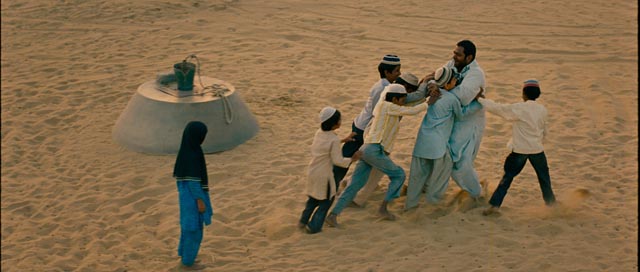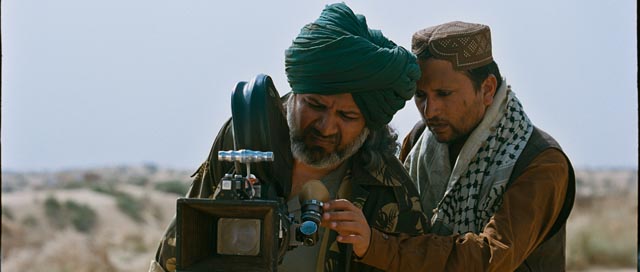What are man-made borders when people across enemy countries share a wonderful love for Hindi cinema? Songs, romance and filmi dialogues can unite them. ‘Filmistan’, the closing film at the recent New York Indian Film Festival encapsulates the power of cinema, and not surprisingly, has won India’s 2013 National Award for the Best Hindi Film.
It shows the heart-warming way in which films can bind differing people together.
In his first feature film, Nitin Kakkar takes you into the world of the ebullient Sunny, who struggles as an assistant film director but longs to be a star in the fantasy world of Bollywood and for whom life is nothing but a filmi dialogue.
Having failed many acting auditions, he goes with an American crew into a remote area of Rajasthan as an assistant director. An Islamic terrorist group kidnaps him, mistaking him for an American crew member and holds him hostage in a small Pakistani village.
A Love Affair with Pirated Bollywood Films
From there on the film is a laugh riot as his host, a Pakistani who deals in pirated Hindi films and he, filmi aficionado extraordinaire, forge a common bond against the grim terrorists. An overwhelming love of Hindi cinema, cricket and food brings warring people together, and reveals that at heart, they are not so different Sharib Hashmi and Inaamulhaq are wonderful in the lead roles in this offbeat, lovable film which without romance, item numbers or box-office trappings, keeps you engrossed right till the end, and leaves you thinking.
Kakkar came to New York for the opening just after collecting the National Award. The film also received a Special Jury Mention at its World Premiere at the Busan International Film Festival and the Best Debut Director at the International Film Festival of Kerala and the Jaipur International Film Festival.

Cinema is the uniting force in ‘Filmistan’
Q and A with Nitin Kakkar, Director of ‘Filmistan’
The Absurdity of Drawing lines on Paper & Fighting Over Land
1. What did your parents tell you about the partition that influenced you the most?
My grandfather was from Lahore – after Partition he went to Jullunder and then to Bombay. I’ve been hearing these stories from childhood. It’s not only my parents but a conversation with a lot of relatives, friends and the Punjabi community who had their home and life in Lahore. One day you are uprooted and told that this is not your home any more. Not only that – this is a different country altogether! Then follows an insane bloodshed which scars the lives of friends and neighbors for years to come. I cannot understand this absurdity. I find it very stupid, drawing lines on paper and fighting over land. The worst is we continue to thrive on hatred, the seeds of which were sown in 1947.
2. In ‘Filmistan’, Is Sunny based a bit on you in his passion for Bollywood and his beliefs about life?
Films do reflect the filmmaker. Yes, there is a big part of me in Sunny, especially the beliefs about life. However, unlike him, I am not a huge ‘Bollywood’ fan, even though I like Indian Cinema. I am more influenced by European cinema, Iranian cinema, and World Cinema.

Fighting the power of cinema in ‘Filmistan’
3. How does it feel to be the director in this first film and call the shots?
The director is the one who slogs the most – he’s just called the Boss! I think a film gets completed only when it meets the audience. The criteria was to make a good film – as a filmmaker I’m very proud to have made this film.
4. Do you think ‘Filmistan’ will be shown in Pakistan?
I really want this film to reach the common man in Pakistan. It is voice of a common man in India. But this thought is not restricted to India-Pakistan Issue. It is relevant to all the countries which are divided into smaller parts. It is a human story. It is relevant every time a human stops being humane.
I want to take it to Pakistan and they would really love to have it released in Pakistan. Whichever way it travels there - the focus is not only to make a film, the focus is to make a difference – if even a few minds are changed, the purpose is solved, I guess.
|

